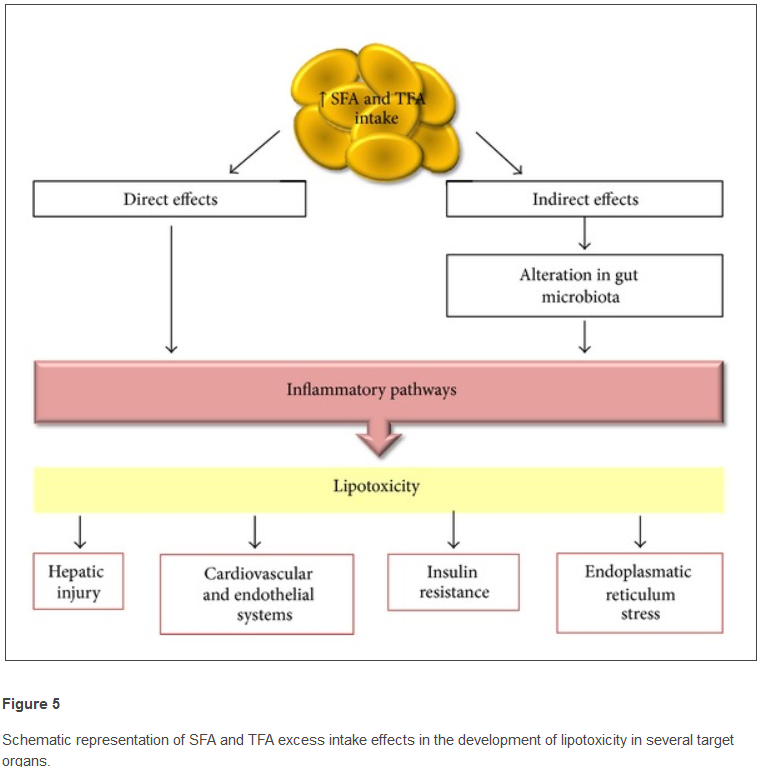Is Food-Based Lipotoxicity a Cause of PCOS?
Did you know that what you eat can make your PCOS problems better -- or worse? There are dozens and dozens of medical studies to bear this out.
Unfortunately, there is a lot of misinformation and confusion about what foods you should be eating or avoiding. As we see it, medical research is one of the best ways to separate fact from fiction, and thus discover the best way forward. That's why we talk a lot about medical research on this site.
Free PCOS Newsletter
Today, we want to share what we think is a very important observation
about diet. It's a bit technical but try to follow along. This is very
important.
First some background. It seems that most doctors
believe that polycystic ovary syndrome is a problem of excessive amounts
of androgens, which are male hormones produced by your ovaries and
adrenal glands. That is why they prescribe pharmaceuticals like birth
control pills or spironolactone.
The purpose of these medications
is to reduce androgens and thus make your symptoms go away. (Polycystic
ovary syndrome is actually a disorder that is much more than a problem
with male hormones. But that's a topic for another time.)
If we
assume that androgens are causing the symptoms of polycystic ovary
syndrome, what is causing the excessive androgens in the first place?
What's Causing the High Levels of Androgens -- and Making PCOS Worse?
There are many possible answers to this question. A very interesting study just released from Université de Sherbrooke in Canada sheds some light on this confusing issue.
In a laboratory setting, researchers analyzed androgen-producing adrenal gland cells. When the cells were exposed to high amounts of a saturated fat, they were stimulated to produce more androgens (male hormones).
Based on this research, could it be that you are consuming too much of the wrong kinds of fat and thus forcing your adrenal glands to produce more androgens?
The researchers conclude: "This study is the first to demonstrate that lipotoxicity can directly trigger androgen overproduction in vitro, in addition to its well-described impact on [insulin resistance], which strongly supports a central role of lipotoxicity in PCOS pathophysiology."
"Lipotoxicity" is defined as the "the pathologic changes in organs resultant from elevated fat levels in blood or tissues". One pathological change appears to be that adrenal gland cells start producing excessive amounts of androgens. These androgens contribute to symptoms of polycystic ovary syndrome.
Essentially, the problem is that you have too much of the wrong kind of fats floating around in your body.
What Causes this Fatty Buildup in Your Tissues?
Some of it comes from the fat you eat, especially saturated fat.
Some of it comes from the refined carbohydrates and convenience foods you eat. For example, high fructose corn syrup is a substance that induces your liver to manufacture fat. This contributes to fatty liver degeneration, which is present in nearly one-half of women with polycystic ovary syndrome.
A third source of the fatty buildup is your inability to efficiently burn fat. Fat-burning is a complex process beyond the scope of this article. But increased exercise would help.
Bottom Line:
- "Lipotoxicity" is a major cause of your polycystic ovarian syndrome symptoms.
- You must distinguish between dietary fats you should be avoiding and those you actually need.
- You must understand that consumption of refined carbohydrates and sweeteners makes your fat problem worse.
- Excessive undesirable fats in your body increase your symptoms and damage your organs. Even your brain can be adversely affected!
Your diet is the #1 key to solving your PCOS problems. If you have a copy of The Natural Diet Solution for PCOS e-book, please review the section on Fats and Oils. Also take a look at the section on Carbohydrates. You need to apply this information if you are to make progress against polycystic ovarian syndrome.
See Related PCOS Diet Articles
- What's a Good Diet?
- Hidden Threat to Ovarian Health Found in Foods
- Which Carbs Are Best?
- The Dangers of GMO Foods
- GMO Foods Article Stirs Controversy
- The Benefits of Juicing
- The Eat Right for Your Type Diet
- You Need Antioxidants
- What Do Pot and Fatty Foods Have in Common?
- Like Bread? Than Have Berries Too!
- Brown Rice a Good Grain Choice
Get Answers to your Questions about
- Fertility
- Weight Control
- Hair Loss
- Stress
- Unwanted Hair
- Acne...and more!
FREE PCOS Report
and Newsletter

Your email is safe with us. We respect your privacy, and you may unsubscribe at any time.
Recent Articles
-
PCOS Long Journey to The Happy End
Apr 30, 18 07:24 PM
Hi Girls, Maybe my story will have one day a good end but I am not there yet. Until I was 31 years old I lived my dream, having lovely husband, good -
PCOS and Miscarriage
Apr 17, 18 04:03 PM
Proper diet and natural supplements can help the body maintain a pregnancy through successful delivery.
-
How to Deal with PCOS and Stress
Apr 04, 18 04:19 PM
Your body has a natural capacity to heal itself if you provide it with the necessary tools.






